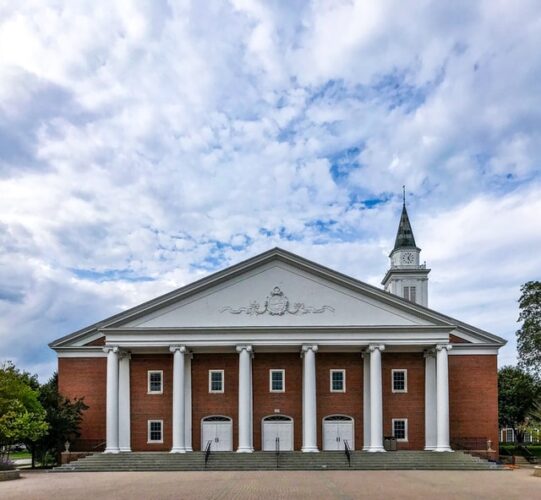This is a common phrase, but G. K. Chesterton disagreed and said, “Christianity has been found difficult and therefore untried.” What the famous Chesterton really meant is that while multitudes profess Christianity, few really practice it.
The Bible teaches that all human beings are created in the image of God. That foundational truth leads to teaching on how we are to treat all human beings.
Jacob (James) says of the tongue, “With it we bless our ADONAI and Father, and with it we curse people, who are made in the image of God. . . these things should not be.” (Jacob 2:9,10)
Paul said, “From one He made every nation of men to live on the face of the earth, having set appointed times and the boundaries of their territory. They were to search for Him, and perhaps grope around for Him and find Him.” (Acts 17:26, 27)
Yeshua said, “Love your enemies, do good to those who hate you, bless those who curse you, pray for the ones who mistreat you.” (Luke 6:17)
The Biblical teaching provided the unique understanding that led Thomas Jefferson to write, “We hold these truths to be self-evident, that all men are created equal and are endowed by their Creator with certain unalienable rights, that among these are life, liberty and the pursuit of happiness.”
Actually, these truths are not self-evident but came from Biblical revelation since these truths are not proclaimed in other cultures. The Bible alone gives us the ideal of all people being of worth and deserving of dignity, respect, love, and equal justice under the Law.
Without the biblical world view influence in the West (it did have sway in the Middle East for a season before Islam), we would not have made significant progress toward human rights. Many are sounding the alarm that rejecting the Biblical Jewish and Christian roots of the West will not lead to greater freedom and justice but to a new tribalism and a new barbarism in the way we treat people. We see Jewish leaders warning about the decline of Christianity in the West. We can name so many. Rabbi David Lappin, Rabbi S. Boteach, Dennis Prager, David Horowitz. The culture war against Christianity if successful will end in disaster. We note as well, the words of an atheist historian who is yet worried about the cultural trends and not acknowledging this. Here is a little of what a book reviewer wrote.
Dominion: How the Christian Revolution Remade the World, which has come as something of a surprise for several reasons. First, Holland is not a Christian. Second, Holland’s book is one of the most ambitious historical defenses of Christianity in a very long time. While studying the ancient world he realized something. Simply, the ancients were cruel, and their values utterly foreign to him. The Spartans routinely murdered “imperfect” children. The bodies of slaves were treated like outlets for the physical pleasure of those with power. Infanticide was common. The poor and the weak had no rights.
How did we get from there to here? It was Christianity, Holland writes. Christianity revolutionized sex and marriage, demanding that men control themselves and prohibiting all forms of rape. Christianity confined sexuality within monogamy. (It is ironic, Holland notes, that these are now the very standards for which Christianity is derided.) Christianity elevated women. In short, Christianity utterly transformed the world.
In fact, Holland points out that without Christianity, the Western world would not exist. Even the claims of the social justice warriors who despise the faith of their ancestors’ rest on a foundation of Judeo-Christian values. Those who make arguments based on love, tolerance, and compassion are borrowing fundamentally Christian arguments. If the West had not become Christian, Holland writes, “no one would have gotten woke.”
Then how do we account for the injustices in the history of the West, the cruelty of religious wars, slavery, colonialism, racism, and so much more? We account for it by realizing that Christianity has been a battle against the native proclivities of fallen human beings. Most were really not discipled to live as Messiah and to follow his ways of peace, reconciliation, and love. When such people came to the fore, people of deep godly goodness, they produced great gain. The influence of such people as John Newton, the former slave trader, and writer of the beloved hymn Amazing Grace is amazing. When he said this grace “saved a wretch like me” he was referencing his cruel work in the slave trade. His friend William Wilberforce was the key member of Parliament whose Christian faith motivated him to see the elimination of slavery throughout the British Empire. Champions of civil rights like Jonathan Blanchard, the founder of Wheaton College (1860), and the great revivalist and leader at Oberlin College, Charles Finney played significant roles. We read of Harriet Beecher Stowe, and Uncle Tom’s Cabin without realizing that her Evangelical father and brother were abolitionist pastors. Her biblical faith motivated her.
Alas, progress always came from a minority, but it came and was based on reading the Bible Most rationalized their unbiblical views and yet claimed to be Christians. The history of the Western World is a history of the struggle to really convert the paganism of the heart. Paganism remains in the heart and syncretism is the rule. Maybe it was not the syncretism of bowing down to the gods of Canaan, but it was the syncretism of war, cruelty, slavery, and colonial exploitation. Sometimes the missionaries who wanted to lift the population fought the leaders of the companies and governors who were there to despoil the natives for the enrichment of the home country. The Bible’s teaching was and is dismissed as impractical, or only for the really few who are called to a more rigid obedience. The rest can call themselves Christians and even attend Church while they engage in the real politic of state craft, or rapacious business dealings, or sexual exploitation. Truly Chesterton was right. Christianity was found difficult and was not usually really tried.
Today we deal with social protests on the issue of racism. How much racism still exists in America, how systemic it is in police departments or other sectors of society is a great ongoing debate. There will be statistics, surveys, and studies after the smoke clears (literally). Drawing conclusions on this is not the point of this essay. The turn to Marxism and socialism as providing solutions would be a disastrous turn. Only the power of the Gospel and a more Biblical influence will take the United States forward in a lasting and positive way. There needs to be much repentance for the lack of faithfulness to the claims of the Gospel. Some are leading in this. I should note that racism, enslaving other populations, and genocide are part of the terrible and long history of most world cultures. It is not a specifically European/American problem.
One story will have to suffice and will show us the depth of the problem in the human heart. In 1906 the Holy Spirit was poured out in meetings on Azuza Street in Los Angeles. The meetings were led by a black preacher, William Seymore. These meetings launched what we now know as Pentecostalism. Today Pentecostalism and its offshoots in the new charismatic movements and networks are by far the largest and most effective movements of growth in Protestant Christianity. There is amazing growth in China, Asia in general, India, Africa, and South America.
That the leader, in the beginning, was a black preacher should have said something to all who followed after. It was that God was after an inclusive movement that broke down all barriers of race and ethnicity. In the beginning, it was so. Then something happened. The whites decided that it was unseemly for them to be in a movement with blacks and they split from the blacks and started white Pentecostal denominations. Hence the largest Pentecostal denomination in America, the Church of God in Christ, is a black denomination. There has been verbal repentance from the leaders and spoken reconciliation, but so much more needs to happen in joining together to see the Gospel go forth with power and to focus on solving the issues of the underclass black communities. We could give so many more examples. What did this happen? It was rationalization. It was part of the long history of Christianity. As a Messianic Jew, I can point to the worst of it all, the long history of Anti-Semitism in the West. Yes, “Christianity was found to be difficult and untried.” But thank God for those who tried it. Much of the real progress in the west is due to them and Holland saw it.









